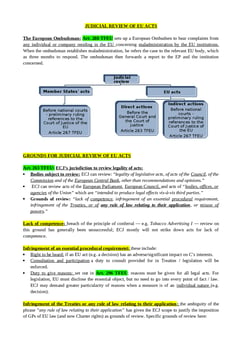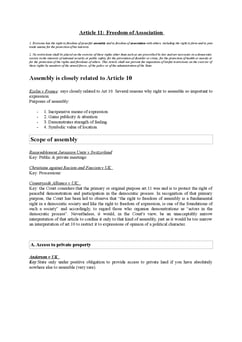- Law Cases
- European Law Cases
- The sources of ec law and its supremacy over national law in the event of conflict Cases
11/70 Internationale Handelsgesellschaft [1991] ECR 2925
Judgement for the case 11/70 Internationale Handelsgesellschaft
KEY POINTS
Community law is a distinct legal system, separate from national and international law, arising from an autonomous source. The Community is not a state but a unique entity in progressive integration.
Article 24 of the German Constitution allows for transferring sovereign rights to inter-state institutions but doesn't permit changes to the Constitution's basic structure via amendments or secondary Community legislation.
The German Constitution's fundamental rights are integral and cannot be qualified. This is particularly significant since the Community lacks a Bill of Rights and a democratically legitimized parliament.
In case of conflicts between Community legislation and fundamental rights in the German Constitution, the Constitution takes precedence unless addressed by competent Community organs.
The European Court of Justice can assess the legality of Community law but cannot make binding statements on its compatibility with fundamental rights in the German Constitution. German courts require an Article 177 EEC ruling for such assessments.
The German Constitutional Court does not determine the validity of Community law but may limit its application if it conflicts with fundamental rights.
The Bundesverfassungsgericht (Federal Constitutional Court of Germany) can review German State actions implementing Community regulations, primarily focusing on inapplicability regarding fundamental rights.
FACTS
A German import/export company challenged EVSt's decision to forfeit their export deposit based on European Community regulations. The case saw a preliminary ruling by the European Court of Justice, affirming the regulations' legality.
The Verwaltungsgericht (Administrative Court) paused proceedings to request a Bundesverfassungsgericht ruling on whether these European Community obligations align with the German Constitution, citing concerns about proportionality and economic freedom.
The Verwaltungsgericht argued for milder alternatives to achieve the same goals as the export deposit system and deemed it unconstitutional that deposits be forfeited without fault.
The Federal Minister of Justice objected to the reference's admissibility, suggesting the Verwaltungsgericht should have included the EEC Treaty Ratification Act 1957. The Bundesverwaltungsgericht had not previously ruled on the regulations' constitutionality.
The plaintiff company was allowed to present its case, and the Verwaltungsgericht deemed the reference admissible for further legal scrutiny.
JUDGEMENT
-
In response to a reference made by the Administrative Court of Frankfurt am Main for judicial review, the Court reached the following verdict:
It was established that the fundamental rights provisions enshrined in the German Constitution were firmly entrenched. Accordingly, the Bundesverfassungsgericht was authorized and obligated to scrutinize provisions of Community legislation in relation to these fundamental rights as long as the Community lacked its own Bill of Rights and a politically responsible Parliament.
Concerning the system of export licensing and deposits for grain, as introduced under the common agricultural policy of the European Economic Community (EEC), it was decreed that such a system does not constitute an infringement upon the freedom of commerce as stipulated in Article 12 of the German Constitution.
Notably, the latter of the holdings above was reached unanimously, while the remaining decisions were reached by a majority of five votes to three.
COMMENTARY
Community law, distinct from national and international law, arises from an autonomous source. The German Constitution allows the transfer of sovereign rights without altering its core structure. Constitutional fundamental rights are inviolable. In conflicts between Community law and the German Constitution, the latter prevails unless addressed by competent Community bodies.
The European Court of Justice assesses Community law's legality, while German courts require an Article 177 EEC ruling for compatibility with constitutional rights. The German Constitutional Court may limit Community law's application if it violates constitutional rights. The Bundesverfassungsgericht reviews German State actions related to Community regulations, focusing on fundamental rights.
A German import/export company contested EVSt's decision based on European Community regulations. The Verwaltungsgericht sought a Bundesverfassungsgericht ruling on their compatibility with the German Constitution, advocating for alternatives to the export deposit system. The Federal Minister of Justice questioned the reference's admissibility, and the Court unanimously ruled that Community law didn't infringe upon the freedom of commerce.
ORIGINAL ANALYSIS
Plaintiff, German farmer, argued that the forfeiture of a deposit unless exports were made within a time period under a directive, contradicted constitutional rights of German constitution, including rights of economic freedom.
German court referred to ECJ the question of whether the regulation was lawful.
-
ECJ held that
Community laws cannot be invalidated by rights contained in national constitutions/legislation, and
That the EU enshrines the constitutional rights common to Member States, including the one in question, but considered as a matter of fact that the right had not been infringed.
AG Dutheillet de Lamothe
The fundamental principles of the national legal systems contribute to permitting Community law to find in itself the resources necessary for ensuring, where needed, respect for the fundamental rights which form the common heritage of the member-States.
This was the case regarding economic liberty.
ECJ
See below for the supremacy points.
Compliance with fundamental rights is an integral part of the general principles of law of which the Court of Justice ensures respect.
This includes the principle of economic liberty, guaranteed under the German constitution.
----
NB The German Supreme Court later heard this case and found that actually the regulation HAD infringed the principle of economic liberty. This shows that actually the ECJ will struggle to remove the difference in rights protection between the EU and Member States.
For Further Study on 11/70 Internationale Handelsgesellschaft

European Law notes fully updated for recent exams at Oxford and Cambrid...
Need instant answers? Our AI exam tutor is here to help.
Ask questions 🙋 Get answers 📔 It's simple 👁️👄👁️
Our AI is educated by the highest scoring students across all subjects and schools. Join hundreds of your peers today.
Get StartedSimilar Cases
Related Product Samples
These product samples contain the same concepts we cover in this case.

 Since 2010, Oxbridge Notes has been a trusted education marketplace, supplying high-quality materials from top achievers at universities like Oxford, Cambridge, LSE, Harvard, and Yale.
Since 2010, Oxbridge Notes has been a trusted education marketplace, supplying high-quality materials from top achievers at universities like Oxford, Cambridge, LSE, Harvard, and Yale.